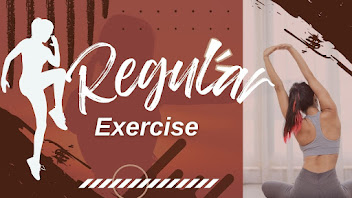Balanced Diet:
A reasonable eating regimen implies getting the right blend of supplements your body needs. Imagine your plate as a pie chart: half of it should be filled with fruits and vegetables, a quarter with proteins, and the last quarter with whole grains. And don't forget those healthy fats! They’re essential for brain health and hormone regulation.
Hydration:
Water is your best friend. Staying hydrated is key to maintaining energy levels, keeping your skin glowing, and aiding digestion. Aim for at least eight glasses a day, more if you're active. If plain water bores you, try adding a splash of lemon or cucumber for a refreshing twist.
Regular Exercise
Finding Your Routine:
Exercise doesn't have to be a chore. The best exercise is the one you appreciate on the grounds that that is the one you'll stay with. Whether it's yoga, running, dancing, or lifting weights, find something that gets you moving and makes you smile. Consistency is key, so make it fun!
Benefits of Cardio:
Cardio is fantastic for your heart health. It improves circulation, reduces the risk of heart disease, and helps you maintain a healthy weight. Exercises like running, cycling, and swimming are fantastic decisions. Aim for at least 150 minutes of moderate cardio each week.
Strength Training:
Don't shy away from weights. Strength training builds muscle, boosts metabolism, and strengthens your bones. Plus, it can help you perform everyday activities with ease. Start with bodyweight exercises like squats and push-ups, then gradually add weights as you get stronger.
Flexibility and Stretching:
Flexibility is often overlooked but incredibly important. Stretching improves your range of motion, prevents injuries, and reduces muscle tension. Integrate extending into your daily schedule no less than three times each week. Yoga is also a great way to enhance flexibility and find your zen.
Mental Wellness
Importance of Mental Health:
Psychological well-being is similarly pretty much as essential as actual well-being. It influences our thought processes, feelings, and actions. Taking care of your mind can improve your overall well-being and quality of life. Keep in mind, that it's alright to request help when you really want it.
Meditation and Mindfulness
Meditation and mindfulness are powerful tools for mental wellness. They help reduce stress, improve focus, and increase self-awareness. Begin with only five minutes every day and slowly increment the time. Applications like Headspace and Quiet can direct you through the cycle.
Social Connections:
Humans are social creatures, and strong connections can enhance our mental health. Spend time with loved ones, join clubs or groups that interest you, and don’t hesitate to reach out to friends when you need support. Healthy relationships are vital for a happy life.
Sleep Hygiene
Importance of Sleep:
Sleep is when your body repairs itself, so skimping on it can have serious consequences. Quality sleep improves your mood, boosts your immune system, and sharpens your mind. Adults should aim for 7-9 hours per night.
Tips for Better Sleep:
Make a loosening up sleep time routine to indicate to your body that now is the ideal time to slow down. Keep your bedroom cool and dark, avoid screens an hour before bed, and try reading or listening to calming music. Consistency is crucial, so stick to a regular sleep schedule.
Stress Management
Identifying Stressors:
Stress is a piece of life, yet constant pressure can hurt your well-being. Identifying what stresses you out is the first step. Keep a journal to track your stressors and see if there are patterns. Mindfulness is the way to oversee pressure really.
Coping Mechanisms:
Once you know what triggers your stress, find healthy ways to cope. Exercise, leisure activities, and investing energy with friends and family can help. Deep breathing exercises, yoga, and meditation are also excellent for reducing stress. Find what works for you and make it a normal piece of your daily schedule.
Preventive Health Care
Regular Check-Ups:
Try not to hold on until you're wiped out to visit the specialist. Regular check-ups can catch potential issues early and keep you in good health. Make appointments for annual physicals, dental check-ups, and eye exams. Prevention is better than cure! |
Vaccinations and Screenings:
Staying up-to-date with vaccinations and screenings is crucial for preventing diseases. Talk to your doctor about what’s recommended for your age and lifestyle. Screenings for conditions like cancer, diabetes, and cholesterol levels can save your life.
Conclusion
Taking care of your health and wellness doesn't have to be complicated. It's about making small, consistent changes and sticking with them. Eat well, stay active, manage your stress, and prioritize your mental health. Remember, you only get one body—take good care of it!
FAQs
1. How can I start eating healthier?
Begin by integrating more products of the soil into your feasts and decreasing handled food varieties. Planning your meals ahead and cooking at home more often can also make a big difference.
2. What’s the best exercise for overall health?
The best activity is the one you appreciate and will stay with. A mix of cardio, strength training, and flexibility exercises is ideal for overall health.
3. How can I improve my mental wellness?
Practice care, remain associated with friends and family, and look for proficient assistance if necessary. Regular physical activity and a balanced diet also support mental health.
4. Why is sleep so important? Sleep is essential for repairing the body, boosting the immune system, and improving cognitive function. Unfortunately, rest can prompt different medical problems.
5. How often should I see a doctor?
It's recommended to have an annual physical exam, but you should see a doctor more often if you have any health concerns or chronic conditions.













.jpg)



.jpg)






.jpg)



.jpg)


0 Comments